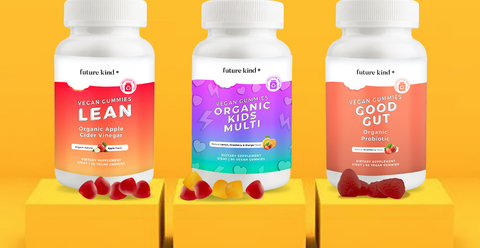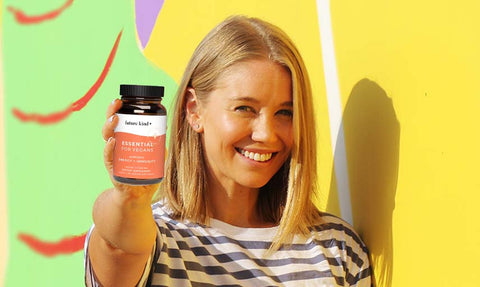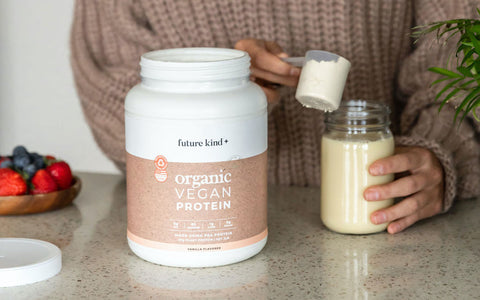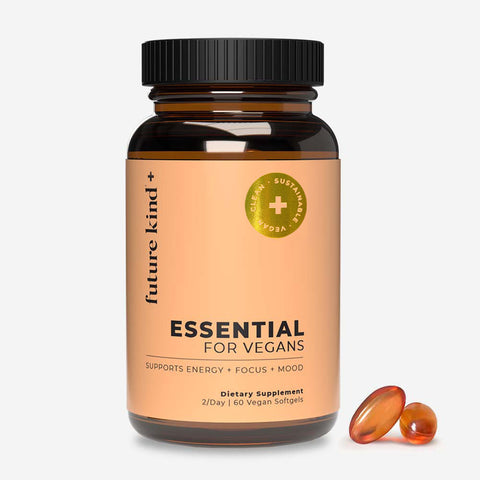If you had asked a vegan what their opinion on vegan cheese was five to ten years ago, they probably would have been very vocal in their distaste.
Ask anyone who ate vegan cheese products back then, and they likely would have expressed serious disappointment in the grainy, plastic-like texture of early dairy-free cheese.
Vegan cheese has come a long way since then, now offering an endless variety of flavors and shapes that are all delicious, melt beautifully, and can go head-to-head with traditional dairy cheeses.
In 2019, vegan cheese sales grew by 51% compared to the previous two years, becoming one of the fastest-growing markets in the plant-based world.
Just like finely aged cheese, this vegan alternative keeps getting better as time goes on.
So, how did we get to this point?
What Is Vegan Cheese Made From?

More often than not, the best vegan cheese is made from a mix of different ingredients coming together to replicate the texture, flavor, and smell of dairy cheese.
Soy
Unsurprisingly, the humble soybean is once again the star of a great vegan substitute.
The popular brand Follow Your Heart uses soy as the main ingredient for their scrumptious Vegan Gourmet cheeses, which are somewhat softer than traditional dairy cheese.
The veteran vegan brand Tofutti also uses soy to craft their slices and cream cheese, and while they might lack the stretchiness of dairy cheese, their soft texture is able to melt and spread beautifully.
Coconut Oil
Coconut oil has rapidly become the most common key ingredient for making stretchy, melty vegan cheese that looks and tastes like the real deal.
This cheese-like richness is mostly due to the fattiness of coconut itself, so it’s wise to consume these products in moderation if you’re looking to reduce your intake of saturated fat.
Leading brands such as Violife, Koko, and Sheese all use coconut as the building block of their delicious cheeses – one bite and you’ll understand why it’s such a popular option!
Nuts and Seeds
All types of nuts and seeds can be used to craft vegan cheese, making this option the most healthful out of the three—they’re whole foods, after all.
Kite Hill makes spreads and cheeses using almonds, while Treeline prefers using cashews, easily the most popular and versatile nut-cheese ingredient.
The result is a vegan cheese that replicates the taste and texture of artisanal cheeses such as Camembert and Brie: rich, creamy, and with a slightly nutty flavor that’s not too overpowering.
The Best Vegan Cheese Brands, Ranked
Best All Rounder - Violife
This Greek brand has become the uncontested leader of vegan cheese around the world, offering a selection of cheese varieties ranging from mozzarella shreds to vegan halloumi.
Violife is a definite favorite among vegans because it has it all: a perfect melt, a rich cheesy taste, and an affordable price. We recommend their epic mature cheddar slices for the best vegan cheese toasties you’ll ever try!
Most Creamy - Chao
Chao Creamery is a North American favorite that really has the creaminess of dairy cheese down.
Their melt-in-your-mouth slices are made from a delicious blend of coconut oil and fermented tofu, and while their product range is still quite limited, this is a vegan cheese you do not want to miss on!
Ultimate for Spreads - Sheese
Veteran vegan cheese brand Sheese is best known for offering revolutionary, creamy cheese spreads that the brand introduced in 2006. They surely have expanded their range since then, so much so to become the number one choice of vegan topping for Papa John’s UK takeaway.
Sheese products melt beautifully and have an addictive saltiness, but the stringiness is not quite there yet – their cheese is better sprinkled over pizza than it is in grilled cheese!
Magic Melter - Daiya
American plant-based pioneer Daiya has been around for ages, yet their cheese still manages to polarize opinions all over the world.
The pungent and distinctive taste of Daiya cheese is much of a “love it or hate it” deal, but this is one vegan cheese guaranteed to melt perfectly, just like the real thing.
Top for Taste - Follow Your Heart
The Californian brand Follow Your Heart has built its reputation over ingenious products like Vegan Egg and Vegenaise, but the brand’s cheese selection is no less impressive.
Unfortunately, this is one of the hardest brands to get a hold of in major supermarket chains, and the price tag is not the most accessible either. Rest assured however, it is worth every penny!
Where Can You Buy Vegan Cheese?

Supermarkets
Different brands of vegan cheese are now available at various supermarkets throughout Europe, the U.K., Australia, and North America.
All the leading supermarket chains in the U.K. offer their own brand of vegan cheese, while in the United States you will be able to find Daiya products at your local Target or Kroger’s.
Health food stores
Your next stop should be your local health food store, with Whole Foods being a prime example in the United States. Natural or healthy living stores are likely to stock a variety of vegan cheese brands – ideal if you don’t mind the steeper price tag!
Online retailers
If no stores in your area seem to carry vegan cheese products, online retailers will be your best bet. Online vegan supermarkets like The Vegan Kind and GreenBay offer a growing selection of vegan cheeses from the most popular brands.
If all else fails, simply browse through Amazon for some bulk deals you won’t be able to pass up!
How to Make Your Own Vegan Cheese – 2 Simple Recipes Anyone Can Follow!
Not everyone is fortunate enough to live in an area where vegan cheese is readily available (yet!), but the good news is that you can make delicious vegan cheese from the comfort of your own home.
You don’t have to be a masterful plant-based chef either to nail these simple recipes!
Recipe 1 - Potato, Cauliflower, and Nooch Vegan Cheese Sauce
The selling point of this recipe is that most of the required ingredients will likely be in your kitchen already! On top of that, folks watching their diets will be happy to know that this vegan cheese sauce is low-fat, low-calorie, and nut-free.
Start by frying two cloves of garlic in a pot over a medium heat before adding in some veggie stock and water.
Add in 500g of potatoes, peeled and cubed, along with 400g of cauliflower florets. Pour enough water to cover all the veggies, adding paprika, turmeric, salt, pepper, and one cup of nutritional yeast.
Let it all simmer for 15 minutes, and add a splash of your preferred non-dairy milk as the sauce starts to thicken. Once the vegetables are fork-tender, you can either transfer the mixture into a traditional blender or instead use a hand blender to create your creamy cheesy sauce.
This is the perfect sauce for dipping nachos and loading quesadillas, as well as a great garnish drizzled over salads and Buddha bowls.
Recipe 2 - Cashew Cream Vegan Cheese

This cheese is perfectly creamy and cheesy, healthy, and surprisingly quick to make. A sturdy blender is all the equipment you need—you’ll want to put this cheesy cashew cream over everything you eat!
We recommend using this spread on toast and bagels, or adding it to a simple tomato pasta sauce for an extra cheesy kick.
Start by soaking 200g of cashews in warm water, overnight.
Once rinsed, put the cashews in a blender with one tablespoon of water, along with the juice of one lemon, three tablespoons of nutritional yeast, and salt and pepper to taste. Blend it all together on high, adding a few more drops of water if needed.
Transfer the mixture into a small bowl and add some optional chives if you’re looking for an herby taste. All that’s left to do is to let it sit in the fridge for a couple of hours, and then it’ll be ready to eat! The best part is that this vegan cheese keeps in the fridge for up to 4 days.
Bonus Recipe: Vegan YouTuber Henya Mania’s Vegan Nacho Cheese
While on the lookout for a standout vegan cheese recipe, I had to ask my good friend and decade-long ethical vegan Henya Mania for her favorite plant-based cheesy recipes, plus some thoughts on the vegan cheese phenomenon as a whole. This is what she had to say:
“Before I went vegan in 2006, I was a huge cheese fan.
Giving up cheese was the hardest part of going vegan, but I believed that making that sacrifice for the planet and the animals was no big deal in comparison.
Thankfully as the vegan movement grew, so did the vegan options available – new vegan substitutes are filling the market and I am living for it!
My favorite meal to make with vegan cheese is grilled cheese sandwiches, and I also love myself a good cheese platter. Today, however, I want to share a new recipe I came up with during quarantine… vegan cheese has never tasted so good”!
Vegan Cheesy Nachos con Carne
So, how would you use vegan cheese to make a scrumptious recipe?
Here are some loaded bean and meat nachos (all vegan, of course) that will definitely impress vegans and non-vegans alike.
This recipe is ideal for sharing and it’s guaranteed to be the star of your party platter!
How to Make:
Slice 3 flour or corn tortillas into 8 pieces, covering each with a small amount of vegetable oil. Bake in the oven at 180C for around 10 minutes, or until golden crispy.
While your nachos are baking, start cooking your chili sauce by soaking one cup of TVP (or alternatively, soy mince) in veggie stock.
Start preparing your sauce by frying two garlic cloves and one shallot over a medium heat, adding a cup of tomato sauce along with hot paprika, cumin, salt, and pepper.
Once your mince is cooked and ready to be used, add it to the bubbling sauce along with one can of kidney beans and sweetcorn. Let the sauce simmer until thickened.
Time to start layering! Start with your nachos, add the chili sauce, and top it all off with a generous amount of your favorite vegan cheddar shreds and nutritional yeast.
For added creaminess, you might want to prepare an additional cheese sauce by mixing a vegan cream cheese of your choice with nutritional yeast, turmeric, olive oil, and cool water.
Continue layering and finish with a topping of creamy cheese sauce, sliced jalapenos or chopped chives.
Bake at 180C for 15 minutes and you’re all ready to serve it up piping hot – you can thank us later!
Is Vegan Cheese Healthy for You?
So where does vegan cheese fit in a balanced, healthy vegan diet?
First of all, you should know that not all vegan cheeses are created equal.
Nut-based cheeses such as cashew and almond cheese come out on top as the healthiest vegan cheese option, while coconut-based cheeses should be considered more of a “once in a while” treat.
Let’s go through the nutritional pros and cons of plant-based cheese to understand why.
The Good

All vegans should base their diet around whole plant foods first, only allowing tasty treats and dairy substitutes like vegan cheese in moderation. The good news is that dairy-free cheese is definitely not the unhealthiest product you can include in your diet – it comes with a couple of nutritional benefits that may really surprise you!
Cholesterol-free
High cholesterol is one of the main causes of heart disease, as this type of blood fat can build up as plaque and clog your arteries over time.
Vegan cheese is naturally cholesterol-free, a far cry from cholesterol-laden dairy cheeses. Even dairy-free cheeses featuring coconut oil, a source of saturated fats, can actually help lower LDL (“bad” cholesterol) levels and raise HDL (“good” cholesterol) levels.
Fiber
Nut-based cheeses tend to contain the most fiber out of all other plant-based cheese varieties, packing an average of 1g per serving.
While that’s definitely quite low compared to most vegan foods, it makes for a better choice when compared to dairy cheese, which doesn’t contain any fiber.
The Bad

Image By David Dewitt
Vegan cheese doesn’t have nearly the same amount of protein, calcium, and vitamin B12 that dairy cheese offers. Of course, this shouldn’t lead you to think dairy is actually good for you.
Dairy consumption is associated with a higher risk of cancer, osteoporosis, and heart disease due to its high hormone content. You won’t find any of that in plant-based foods, vegan cheese included.
Still, you should be watching your vegan cheese consumption for optimal health and fitness!
Fat
Just like its dairy counterpart, vegan cheese is a refined product that’s high in fat, and in the case of coconut oil-based cheeses, high in saturated fat too.
While healthy fats from nuts and seeds promote satiety and optimal hormone regulation, the high calorie density of these products doesn’t make for the best choice when it comes to portion control.
Sodium
Vegan cheese is also high in sodium, an essential nutrient that in excess can lead to high blood pressure, water retention, and other cardiovascular issues when over-consumed.
Incredibly tasty, high-palatable foods like vegan cheese are harder to portion control.
That is why making your own plant-based cheese might be the way to go if you’re watching your sodium intake – you’ll know exactly how much salt is going in your food!
Dairy-Free Cheese Doesn’t Have to Be Taste-Free
If you’ve been one to scrunch your nose at the mention of dairy-free cheese before, I hope this guide has put you on the path to change your mind.
The science behind vegan cheese is mind-blowing and continues to evolve as time goes on, so if you still believe no plant-based cheese out there has come close to the dairy cheese you’re used to, you might just have to wait a few months until a knockout comes to shake the market once again!
In the meantime however, why not head to your local store and get a hold of one of our picks for the best vegan cheese available? You can have a go at testing all your favorite cheese recipes and see how they hold up – it’s in the interest of science, after all.









Comments (0)
There are no comments for this article. Be the first one to leave a message!